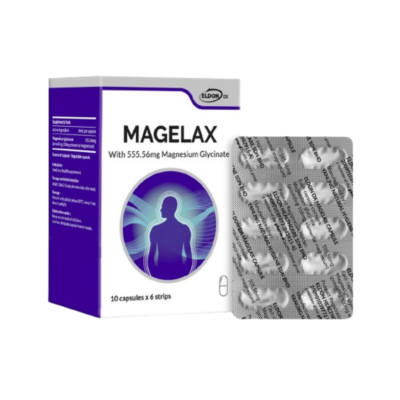This health article has been professionally reviewed by RPh Chong Kai Qian (020209), a registered pharmacist under the Malaysia Pharmacy Board (LFM).
Depression and anxiety, both growing global mental health concerns (1), are also frequently observed as comorbid conditions alongside neurological disorders, such as migraine, epilepsy, Parkinson’s disease.
Interestingly, the therapeutic use of magnesium in mental health dates back to 1921, particularly in cases of agitated depression (2). Studies have found an inverse relationship between magnesium intake and the prevalence of depression in adults (3). In fact, rapid improvement in depressive symptoms has been reported with magnesium glycinate and magnesium taurate supplementation, though it’s important to note that these observations are based on individual case histories rather than large-scale clinical studies (4).
The connection between magnesium and mental well-being can be largely attributed to:
1. The role as a cofactor in converting tryptophan into serotonin
Magnesium aids in the conversion of tryptophan into serotonin—the neurotransmitter often referred to as the “feel-good hormone.” This supports emotional stability and mood regulation.
2. Adjunct to standard antidepressant therapies (5)
A systematic review suggests that magnesium supplementation may help prevent depression and serve as a useful adjunct to standard antidepressant therapies. For example, antidepressants drugs such as sertraline (150 mg/day) and amitriptyline (75 mg/day), when administered over four weeks, have been shown to increase intracellular magnesium levels (6), indicating that higher magnesium levels may improve depression & anxiety.
3. NMDA receptor antagonist and GABA receptor agonist
Moreover, magnesium’s role as an N-Methyl-D-aspartate (NMDA) receptor antagonist (7) and Gamma-aminobutyric acid (GABA) receptor agonist (8, 9) further supports its calming effects on the nervous system, helping to reduce excitatory activity and promote mental relaxation.
Managing depression and anxiety typically requires a comprehensive approach, which may include therapy, medications, and lifestyle changes such as regular exercise, a nutritious diet, sufficient sleep, and effective stress management. Nutritional support also plays a role, with magnesium being one important nutrient. Magnesium is naturally found in various foods like green leafy vegetables, legumes, nuts, seeds, and whole grains. However, achieving therapeutic levels through diet alone can be difficult. In such cases, magnesium supplementation (5), especially in highly absorbable forms like magnesium glycinate, may help support emotional well-being as part of an overall mental health strategy.
Learn more about Magnesium here.
Disclaimer: The information provided is for general knowledge and informational purposes only and should not be considered as medical advice or a substitute for professional consultation, diagnosis, or treatment. Always seek the advice of a qualified healthcare provider with any questions regarding a medical condition.

Reference:
- Institute for Health Metrics and Evaluation. (2022). Global Health Data Exchange (GHDx). https://vizhub.healthdata.org/gbd-results/ (accessed May 14, 2022)
- Weston, P. G. (1922). Magnesium as a sedative. The American Journal of Psychiatry, 78(4), 637–638. https://doi.org/10.1176/ajp.78.4.637
- Jacka, F., Overland, S., Stewart, R., Tell, G., Bjelland, I., & Mykletun, A. (2009). Association between magnesium intake and depression and anxiety in community-dwelling adults: The Hordaland health study. Australian and New Zealand Journal of Psychiatry, 43(1), 45–52. https://doi.org/10.1080/00048670802534408
- Eby, G. A., & Eby, K. L. (2006). Rapid recovery from major depression using magnesium treatment. Medical Hypotheses, 67(2), 362–370. https://doi.org/10.1016/j.mehy.2006.01.047
- Derom, M.-L., Sayón-Orea, C., Martínez-Ortega, J. M., & Martínez-González, M. A. (2013). Magnesium and depression: A systematic review. Nutritional Neuroscience, 16(5), 191–206. https://doi.org/10.1179/1476830512Y.0000000044
- Nechifor, M. (2009). Magnesium in major depression. Magnesium Research, 22(3), 163S–166S. https://doi.org/10.1684/mrh.2009.0192
- Murck, H. (2013). Ketamine, magnesium and major depression—from pharmacology to pathophysiology and back. Journal of Psychiatric Research, 47(7), 955–965. https://doi.org/10.1016/j.jpsychires.2013.02.015
- Schwalfenberg, G. K., & Genuis, S. J. (2017). The Importance of Magnesium in Clinical Healthcare. Scientifica, 2017, 4179326. https://doi.org/10.1155/2017/4179326
- Mitmesser, S. H. (2019). Micronutrient inadequacy in short sleep: Analysis of the NHANES 2005−2016. Nutrients, 11(10), 2335. https://doi.org/10.3390/nu11102335







